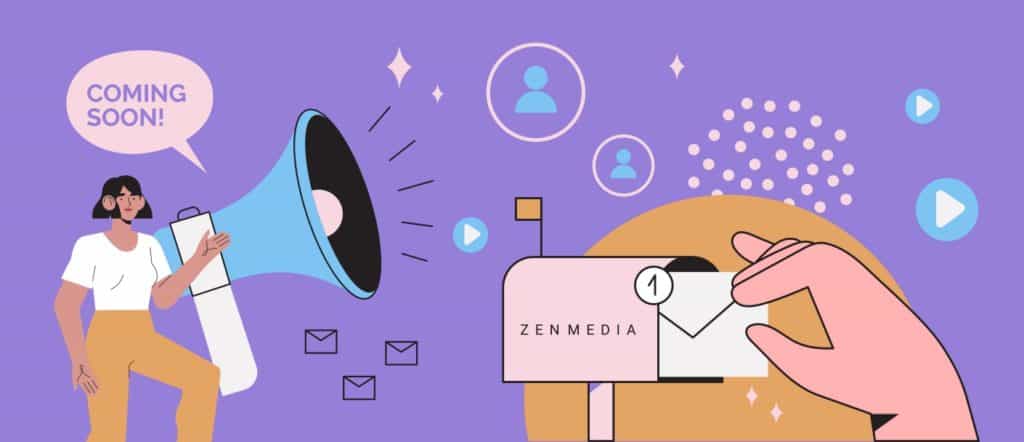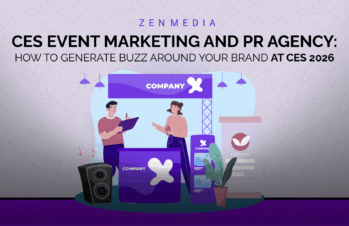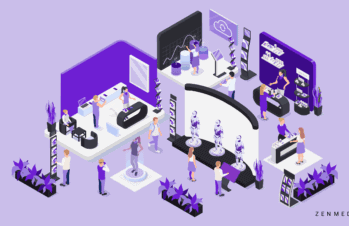The events space has dramatically changed due to shifting regulations, expectations, and standards in the past few years. B2B brands that depend on events for lead generation had to maneuver this space in a way many never thought would become an essential part of their day-to-day. Now, as we emerge from a virtual era filled with lockdowns, Zoom meetings, and online catchups, the B2B world is ready to meet in person again—and that means taking your event marketing to the next level.
Hosting an event is a great way to connect with your community inside and outside your business, and the options for promotion are essentially unlimited. Even with a small budget, your marketing tactics can still significantly impact your bottom line. According to research conducted by event management platform Bizzabo, almost half (48.5%) of the events scheduled through their system for Q2 2022 were in person, compared to only 16.8% of in-person events in Q4 2021. They’ve also seen a two-time increase in hybrid and in-person events in the last three months compared to the three months prior.
This means that most people are not only eager for the opportunity to return face-to-face but also believe that the value they receive forming in-person connections cannot be replaced by virtual gatherings—even though it’s clear that virtual events won’t disappear anytime soon. So regardless if your next event is in-person, virtual, or some combination of both, it will be a phenomenal success as long as there’s the right marketing to give the best results.
The bar is set at a new level as people become more comfortable with hosting in-person events and attending them. You have to give your audience a reason to care about your event and, ultimately, your brand. The right amount of event promotion—before and after—will get feet in the door, generate buzz about your brand, and even convert consumers.
Related Reading: How to Execute a Successful Event Marketing Campaign
Pre-Event Promotion
The one hurdle most marketers find difficult when promoting an event is ensuring it’s effective—creating a strategic game plan before your event is just as important as the event itself. Organizing your corporate event can require some out-of-the-box thinking to ensure you capture your audience’s attention.
Content is King
Obviously, guests are the most important factor for events to work, and without them, the occasion is doomed to fail. People won’t know your event is happening if you don’t tell them it’s there. Curating shareable content leading up to the event can add to the pre-event buzz, tap new audiences for attendees, and keep the event top of mind when it’s all over.
Blogging about your event gives you something other than your event landing page to link to social media. If your posts offer value to your audience, they will also share, increasing your exposure and making it easier to reach a wider audience. Running a teaser digital campaign can add to the anticipation and boost the interest in your brand. Constantly engaging with your audience is a key part of the promotion stage.
Don’t be afraid to involve your guest speakers and partners in your promotion. Whether you’re writing up an enticing description on your event page, sharing related videos and pictures, publishing a blog post about the event, or putting out a press release, the more content there is, the better—and it doesn’t hurt to give it a little B2B SEO love. Every little detail helps push your event front and center.
Be Creative, Engaging, and Personal
It’s crucial to provide a one-of-a-kind experience for your audience. People want to have fun when attending events—this expectation makes them get out of the house to come to your event. Now more than ever, people need a compelling reason to leave their families, spouses, and even pets home alone to go to a work event. So what can you give them that will make it worth their while?
When promoting, focus on the benefits they will get by attending your event, not the features. While the specs are essential, people desire to know what value your event gives them. Knowing what your audience is looking for can be advantageous, improving the chances for more attendees. Knowing what they want, you can better describe why they shouldn’t miss your event. For example, it’s worthwhile to mention there will be an influential photographer available to take headshots for attendees. This is also a chance to play up keynote speakers or any guests that relate to your audience and provide opportunities to network and community build.
Show your guests that you appreciate them and their time, and you’ll often find they’re more than willing to promote your event from sheer gratitude.
Lean Into Social Media
Events are social occasions, and no how-to guide would be complete without the mention of social media. You can promote your event on social media in various creative ways, varying widely depending on the platform.
Facebook and LinkedIn enable you to build a page for the event and invite your professional connections. These platforms make it easier to enter communities interested in specific topics, so find one that fits your event’s central theme. On the other hand, Instagram and Twitter are great places to post creative graphics, real-time updates, and even exclusive behind-the-scenes of what’s coming.
Related Reading: LinkedIn Events: Why They’re Awesome & How To Create Them
Creating an event-specific hashtag is also the perfect way to allow attendees to directly engage with your brand and become active participants in its promotion. Every time you post about your event, you want to always include this hashtag. This goes for your social media posts, other marketing channels, and any printed material. Reinforcing the hashtag helps anchor your event and keeps it on people’s minds. Try to stick to one consistent hashtag. No one likes a hashtag spammer.
Use whichever platforms make the most sense to you, depending on where you expect to find your target audience.
Related Reading: How to Market a Conference
Post-Event Promotion
Ride the Momentum After Your Event
If you thought the promotion period was over because the event has passed, then you’re wrong!
An event should not be the be-all-end-all solution for bringing awareness to your company. Instead, it should be a stepping stone toward your business goals and garner the attention you desire. This is the time to start compounding on all the activity your event has received. In other words: amplify your success, just like a B2B PR hit.
Provide A Summary
Event recap posts are often easy and fun to create. A summary of presentations, photos during the event, and positive feedback quotes can keep the conversation surrounding your brand going and show others what they missed if they didn’t attend. User-generated content is much more relatable to people, so put a few of the best photos on your social platforms. Be sure to tag and mention people.
Related Reading: How to Take Your User-Generated Content from Good to Great
Be Generous With Thank-yous
Show gratitude after the event by thanking the speakers, sponsors, and attendees in follow-up tweets and posts. You can even send out surveys to collect information on what went well and what you can improve for next time. As we mentioned, showing your audience your appreciation is good for networking.
Keep Sharing!
In the days after the event, listen for others’ tweets, mentions, and blog posts. Then, when you see these mentions, share them!
Related Reading: The Zendaya Method: How to Take Your Strategy to the Tipping Point
Corporate events are an excellent way to connect with your employees, customers, and business partners. Nonetheless, there’s little reward without proper promotion, so if you plan to host an in-person event, give it your all. You’re creating an experience that has the potential to build short-term and long-term success for your B2B brand and insert your company in the minds of consumers for a long time to come.
And if you’re looking for a little help (or a lot), reach out! Our B2B event marketing agency would love to help you reach your goals through event marketing.




